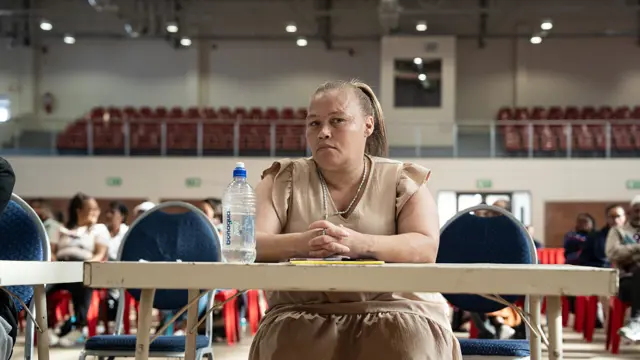Kelly Smith, along with her boyfriend, Jacquen Appollis, and his friend, Steveno van Rhyn, stands trial in connection with the disappearance of six-year-old Joshlin Smith. The young girl vanished from her home in Saldanha Bay in February 2024, prompting a massive search and an emotional public response.
Despite months of investigation, Joshlin Smith remains missing, and the case has attracted national attention due to its disturbing allegations and complex web of testimonies. Defence advocate Rinesh Sivnarain, representing Kelly Smith, used his closing statement to cast serious doubt on the State’s version of events and questioned the reliability of the witnesses who testified against his client. Sivnarain argued that the prosecution’s case rested heavily on statements made by individuals whose motivations and credibility were questionable.
One of the primary targets of Sivnarain’s criticism was State witness Steven Coetzee. Coetzee had earlier testified that Kelly Smith allegedly confided in him about a plan to sell her daughter for R20,000 to a sangoma—an allegation that shocked the court and the public. According to Coetzee, this confession occurred roughly six months before Joshlin disappeared.
However, Sivnarain argued that Coetzee’s testimony was fabricated and opportunistic. “This is a man who saw the media frenzy and public interest around Joshlin’s disappearance and decided to insert himself into the narrative,” Sivnarain told the court. “There is no corroborating evidence to support his version, and he has nothing to lose by embellishing or inventing a story that places him in the centre of a case that has gripped the nation.”
He went on to suggest that Coetzee had ulterior motives, including personal gain or public attention, and emphasized that no physical or documentary evidence linked Smith to any alleged agreement or transaction involving her daughter.
Sivnarain then turned his attention to another crucial witness for the State—Christelle Lombaard, a former co-accused who later turned State witness. Lombaard had provided damning testimony against the accused, claiming to have knowledge of the events leading up to and following Joshlin’s disappearance.
But Sivnarain dismissed her testimony as self-serving and misleading. “She intentionally misled this court,” he said. “She wants this court to believe that her role in this tragic case was minimal—that she was simply a bystander, perhaps someone reluctantly involved. But her attempts to downplay her own involvement are transparent and manipulative.”
Kelly Smith Allegedly Sold Missing Daughter Joshlin Smith to Sangoma for R20,000
He argued that Lombaard had every incentive to minimize her responsibility in exchange for leniency, and her cooperation with the State should be viewed with skepticism. According to Sivnarain, Lombaard’s shifting statements and inconsistencies throughout the trial highlighted her unreliability.
The defence attorney also pointed out that, despite months of investigation and emotional public appeals, no forensic evidence, eyewitness accounts, or surveillance footage had directly implicated Kelly Smith in her daughter’s disappearance. “The prosecution has failed to produce any concrete proof,” he said. “We have heard disturbing allegations, but allegations are not evidence.”
Throughout his closing arguments, Sivnarain reiterated the foundational principle of criminal law: that the burden of proof rests with the State, and guilt must be established beyond a reasonable doubt. He emphasized that emotional reactions and public outrage cannot substitute for hard evidence in a court of law.
“While this case is undeniably tragic and painful, especially because a child is still missing, we must not allow speculation or hearsay to cloud our judgment,” Sivnarain told the court. “Kelly Smith is entitled to the full protection of the law, including the presumption of innocence.”
He concluded his remarks by urging the court to acquit Smith, stating that the prosecution’s case had failed to meet the legal threshold required for a conviction. “There are simply too many holes, too many inconsistencies, and too little proof,” he said. “This court cannot convict someone on stories alone.”
As the trial nears its conclusion, the court will now weigh the closing arguments from both the defence and the prosecution. A judgment is expected in the coming weeks, bringing the nation closer to some form of resolution in a case that has left many questions unanswered—and Joshlin Smith is still missing.
Source – EWN

